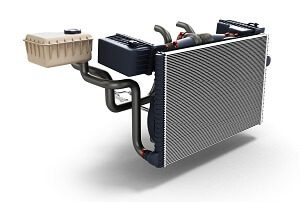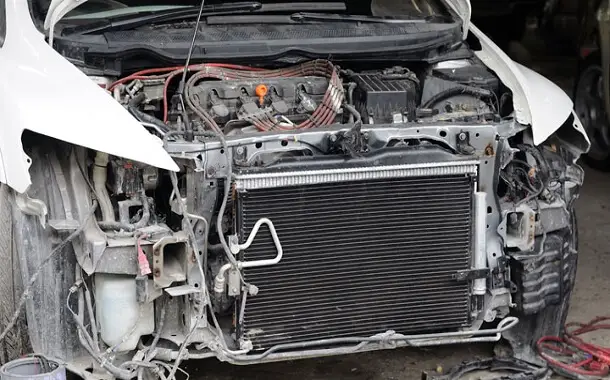Radiator Replacement Cost
Last Updated on December 18, 2022
Written by CPA Alec Pow | Content Reviewed by ![]() CFA Alexander Popinker
CFA Alexander Popinker
A vital part of a car’s proper working is the radiator. This component has multiple roles, and its failure can have serious consequences if they are not properly “treated”. The car radiator is very important because it helps maintain a thermal balance, preventing overheating and excessive stress on the engine. Without this component working properly, the entire car may be affected by rising temperatures.
How much does a radiator replacement cost?
The cost of radiator replacement will be affected by some factors such as the make and model of your car, the complexity of the work involved, and the mechanic you choose. However, the cost of a standard radiator replacement would be anywhere between $300 and $1,200, including the labor involved in the installation and the parts. The average cost of a radiator replacement is around $680.
The cost of a new radiator may vary from one manufacturer to another but will usually be between $190 and $950.
In the table below you will find the average costs of radiator replacement charged by some of the most popular auto repair shops in the United States. In these estimates are included both the labor costs and the parts.
You might also like our articles on the cost of a radiator flush, radiator fan replacement, or coolant leak repair.
Amazon
| Work | Price |
| Parts | $70 – $400 |
| Work | Price |
| Parts & labor | $200 – $460 |
Midas
| Work | Price |
| Parts & labor | $320 – $530 |
Your Mechanic
| Work | Price |
| Parts & labor | $320 – $530 |
If you are wondering how much will the radiator replacement cost for different types of cars, in the table below you will find the costs of some of the most popular vehicles in the country. Though, the costs will vary from one state to another, and from one garage to another.
| Model | Parts | Labor | Total |
| Ford F-Series | $410 – $820 | $340 – $430 | $750 – $1,250 |
| Ford Focus | $200 – $350 | $120 – $150 | $320 – $500 |
| Chevrolet Silverado | $500 – $950 | $150 – $190 | $650 – $1,140 |
| Toyota Camry | $310 – $620 | $250 – $320 | $560 – $940 |
| Nissan Altima | $430 – $570 | $240 – $300 | $570 – $870 |
| Toyota Corolla | $220 – $540 | $100 – $120 | $320 – $660 |
| Honda Civic | $290-$370 | $180 – $230 | $470 – $600 |
| Honda CR-V | $280 – $550 | $200 – $250 | $480 – $800 |
| Ford Fusion | $380 – $690 | $180 – $240 | $560 – $930 |
| Honda Accord | $280 – $380 | $180 – $240 | $460 – $620 |
Radiator overview
Cooling the engine makes it possible to operate it correctly. Without proper cooling, the heat generated by combustion and the friction of the mechanical parts inside would expand the metals, which would lead to damage to the car’s engine, a phenomenon also known as engine seizure.
The temperature developed at the engine level is from 194 °F and can reach up to 221 °F for speed cars. This means that this heat must be dissipated, which can only be achieved by the car’s cooling system, more precisely by means of radiators.
The radiator acts as a heat transfer system. It is based on the existence of a mixture of water and antifreeze, which has the role of taking the excess heat from the engine. This coolant, through the path it travels to and from the engine, takes over the heat.
When should I replace the radiator?
 It’s not always necessary to change the radiator when it leaks because there are several authorized services that deal with gluing or welding radiators at a very low price; almost insignificant compared to the price of a new radiator.
It’s not always necessary to change the radiator when it leaks because there are several authorized services that deal with gluing or welding radiators at a very low price; almost insignificant compared to the price of a new radiator.
Mechanics there can easily apply a patch to solve the whole problem or they can weld the cracked pipe if possible. But if the radiator has been damaged by rust, then there is no way to repair it.
In most cases, the rust causes irreparable damage, so the only solution would be to replace it with a new one. Also, in the case of structural damage, the radiator must be completely replaced.
So, our advice for all car drivers is to never forget to change the coolant, because it does not cost a fortune. But it is best to change the antifreeze in time so as not to reach unpleasant situations, especially since rust also circulates through the engine, so it will gather in very large deposits, which over time will greatly reduce the efficiency of the cooling system.
Symptoms of a faulty radiator
Engine overheating
If you notice that your car is overheating, you should check the radiator immediately. First of all, to avoid any other unpleasant complications, stop the car in the first safe place where you can park it and open the hood so that the engine has additional ventilation. You need to check if the fans are working, trying to see if there are any leaks in the hoses (green/blue liquid = broken/worn hose).
Fluid loss
One of the most common symptoms of radiator failure is fluid loss. These are side effects of both the aging of the components and the road accidents that affected the radiator.
Accumulation of rust in the radiator
Inevitably, the components of a car will be subjected to various weather conditions that can lead to their failure. In the case of the radiator, if it is exposed to high humidity, it will be affected by rust, requiring a change as soon as possible.
Structural damage to the component
If the radiator does not have enough antifreeze, it can suffer structural damage, especially during the cold season, when the temperature drops sharply. In this situation, the coolant may freeze, and the radiator may crack.
The damage can also be due to a strong physical impact, most often occurring on a bumpy road that contains gravel.
How can I save money?
It is very important to find a good deal when it comes to the radiator replacement as this car repair can cost you more than $1,000. But you can do this work yourself if you have the necessary knowledge.
It is pretty easy to deal with minor radiator repairs such as a leaking hose. The hardest part would be the diagnosis of the problem, but you can purchase these parts online at a reasonable price.
Though, if you decide to take your car to a mechanic, look after multiple price offers and choose the one that works best for you. Also, choose a mechanic that has a good reputation and positive reviews even though they might be a little more expensive. A good repair will save you more money in the long run.


Leave a Reply
Want to join the discussion?Feel free to contribute!